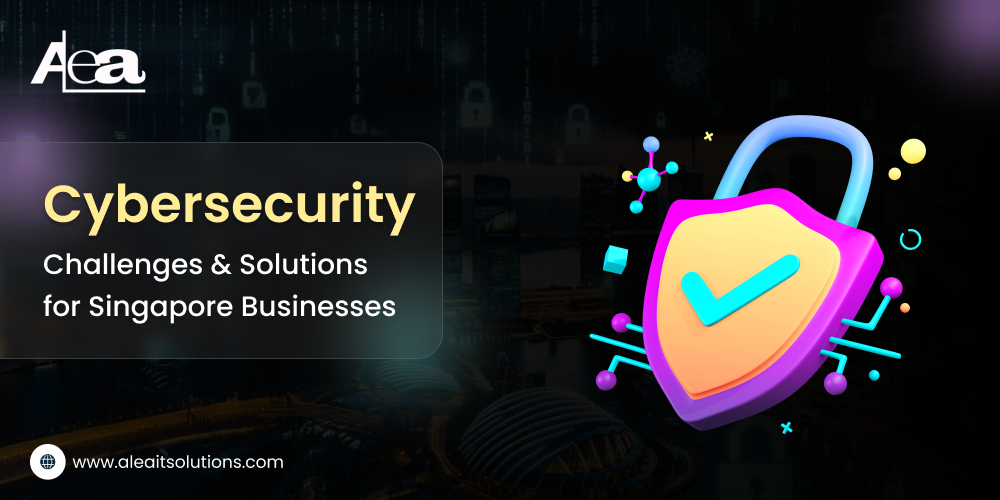In today’s rapidly evolving digital landscape, cyber security is a critical concern for businesses worldwide, including those in Singapore. As businesses continue to embrace digital transformation, they face numerous cyber security challenges that could compromise their data, reputation, and overall operations. From small startups to large enterprises, cyber-security remains a top priority.
In this blog, we will explore the key cybersecurity challenges faced by businesses in Singapore and provide practical solutions to mitigate these risks.
Key Cyber-security Challenges for Singapore Businesses
- Rising Cyber crime and Hacking Attacks As the number of online transactions and digital interactions increases, so does the risk of cybercrime. Businesses in Singapore are increasingly targeted by hackers, who use advanced techniques to gain unauthorized access to systems and steal sensitive data. Whether through phishing attacks, malware, or ransomware, cybercriminals continue to evolve their strategies to breach company defenses.
- Data Privacy and Compliance Risks Singapore has strict data privacy laws, including the Personal Data Protection Act (PDPA), which requires businesses to safeguard their customers’ personal data. Non-compliance can result in heavy fines, legal consequences, and loss of trust. As businesses store more customer data online, ensuring compliance with local and international regulations becomes more challenging.
- Insider Threats While external threats are a major concern, insider threats are also prevalent. Employees or contractors with access to sensitive data may unintentionally or maliciously compromise security. Insider threats can be difficult to detect and prevent because they involve individuals who already have access to a company’s network and systems.
- Inadequate Security Infrastructure Many businesses in Singapore, especially small and medium-sized enterprises (SMEs), lack robust security infrastructure. Limited resources, outdated systems, and lack of cybersecurity expertise often leave these companies vulnerable to attacks. Cybersecurity tools and solutions must be updated regularly to keep up with evolving threats.
- Cloud Security Risks With the growing adoption of cloud computing, businesses are increasingly storing their data in the cloud. While cloud services offer scalability and flexibility, they also introduce new security risks. Inadequate cloud security policies, misconfigurations, and lack of proper access controls can expose businesses to data breaches and cyberattacks.
Cybersecurity Solutions for Singapore Businesses
- Implement Multi-Layered Security Protocols The best defense against cyberattacks is a multi-layered security approach. Businesses should adopt several security layers, such as firewalls, intrusion detection systems, and antivirus software. These tools can help detect threats early and prevent unauthorized access to company systems.
- Employee Training and Awareness Human error is often a significant factor in cybersecurity breaches. Regular training sessions can help employees recognize phishing attempts, use strong passwords, and follow best security practices. A well-informed workforce can serve as the first line of defense against potential attacks.
- Data Encryption and Secure Data Storage Encrypting sensitive data both in transit and at rest is one of the most effective ways to protect it from unauthorized access. Businesses should implement encryption technologies and store sensitive data in secure databases. Regular data backups also ensure that business continuity is maintained in case of a ransomware attack or data breach.
- Conduct Regular Security Audits Regular security audits help identify vulnerabilities within a company’s IT infrastructure. By conducting penetration testing and vulnerability assessments, businesses can identify weaknesses in their systems and address them proactively before cybercriminals exploit them.
- Adopt Cloud Security Best Practices For businesses leveraging cloud services, it’s crucial to implement strong cloud security measures. This includes using multi-factor authentication (MFA), configuring access controls, and regularly reviewing permissions and roles within cloud platforms. Additionally, selecting a reliable cloud provider with strong security certifications is essential.
- Compliance with Regulatory Standards Businesses should prioritize compliance with local and international cybersecurity regulations. Following frameworks like ISO 27001 for information security management and General Data Protection Regulation (GDPR) for data protection helps ensure that companies stay compliant with data privacy laws and avoid heavy penalties.
- Incident Response Planning Every business should have a well-documented incident response plan in place. This plan should outline the steps to take in the event of a cybersecurity breach, from identifying the threat to containing the damage and recovering data. Regular drills should be conducted to ensure that employees are familiar with the procedure.
- Work with Cybersecurity Experts Engaging cybersecurity professionals or managed security service providers (MSSPs) can provide expertise and support to safeguard a company’s network. Experts can help implement best practices, monitor security systems 24/7, and respond to incidents swiftly.
Conclusion
Cybersecurity is a constant challenge for businesses in Singapore, but with the right approach and solutions in place, these risks can be effectively managed. By adopting multi-layered security protocols, training employees, and staying compliant with regulatory standards, businesses can protect themselves from cyber threats and ensure long-term success.
If you’re looking for expert guidance on strengthening your business’s cybersecurity defenses, AleaIT Solutions is here to help. Our team of cyber security professionals can assess your current infrastructure, implement best practices, and provide ongoing support to keep your business safe in the digital age.




